#paddy russel
Explore tagged Tumblr posts
Text
In 1911, the Doctor (Doctor 4) was forced to stop an alien who had been trapped since ancient Egypt or risked the alteration of Earth’s timeline and destruction of its people. ("Pyramids of Mars", Doctor Who, vlm 1, TV)

#nerds yearbook#1911#dw#doctor who#4th doctor#doctor 4#tom baker#lewis greifer#robert holmes#paddy russel#pyramids of mars#sutekh#gabriel woolf#elizabeth sladen#sarah jane smith#unit#bernard archard#marcus scarman#michael sheard#laurence scarman#peter copley#peter mayock#michael bilton#vic tablian#nick burnell#kevin selway#oscar charles#mars#alien
15 notes
·
View notes
Text
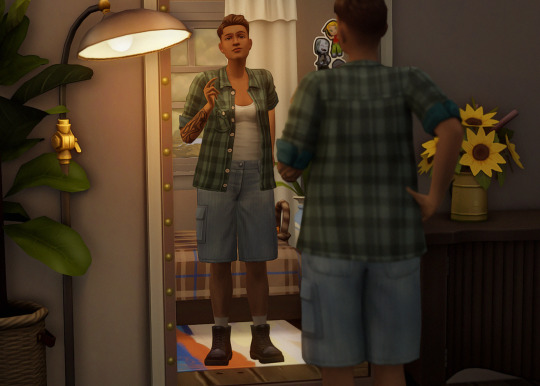
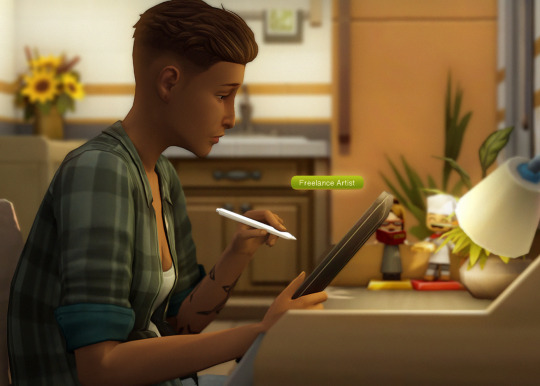
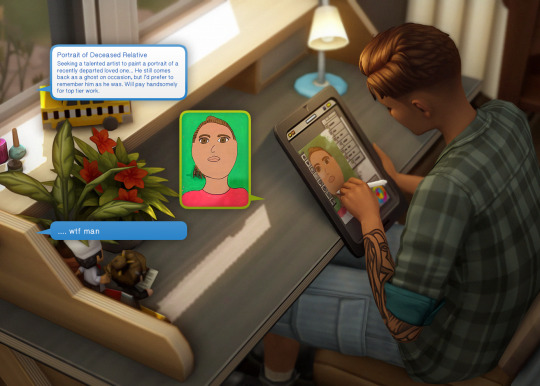
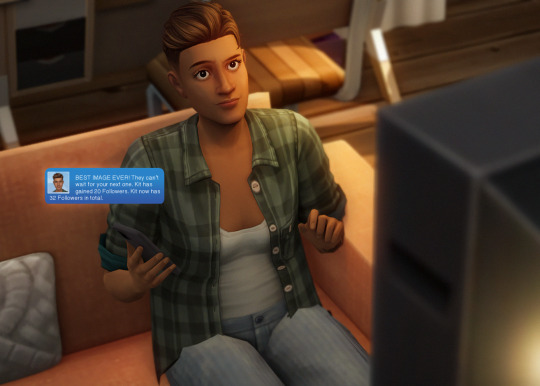
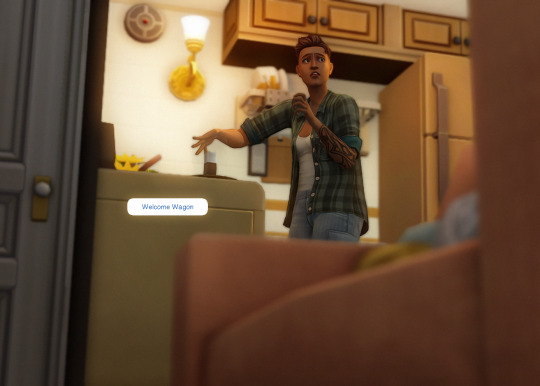
this is kit, please commission some art from them on social bunny 🙏
#ts4#sims 4#just wanted to test out relight but now i have a whole new gameplay i wanna do#my house wifi's been down since friday so i'd nothing better to do lol#assignments shouldn't exist. i should be able to play video games all day >:(#i think i'm going to remove this font replacement cus it can't do accented letters :(#i had to uninstall wickedwhims cus my uni friend wants to play sims on my laptop tomorrow LOL#anyways kits cool though#they're in the same save as virgil's tjol :)#so they might meet him!#uuughhh i fuckin hate thursdays. i'm out of the house for like 14 hours :((#going to england in 8 days tho i'm so excited to see my family again :) they got a new dog too!! a jack russell named paddy lmaooo#i got tagged in kmik posts but i'm saving them for friday night when i'm not busy <3#goodnight simblr#it's 11:50pm and i need to start writing my essay due tomorrow D:
591 notes
·
View notes
Text
338 - The Death of Stalin

After passing off the reins of Veep, Armando Iannucci returned to movie screens with another political satire. Based on the graphic novel, The Death of Stalin farcically recounts the last days of the dictator and the scramble for power in the days after. With stars like Steve Buscemi, Jason Isaacs, and Simon Russell Beale, the film received solid reviews at its 2017 TIFF premiere and solid box office at its spring 2018 release. But thanks to BAFTA recognition and a Screenplay prize from the National Society of Film Critics, some folks predicted The Death of Stalin for a surprise Adapted Screenplay nomination that never came to be.
This episode, we talk about Iannucci's career and how the surprise screenplay nomination for In The Loop stirred Oscar anticipation for this film as well. We also discuss the correct way to pronounce Buscemi, the film's balance between serious-mindedness and farce, and our favorites from the film's ensemble.
Topics also include the 2017 TIFF lineup and the 2018 Adapted Screenplay and Supporting Actor races.
The 2017 Academy Awards
The 2018 Academy Awards
Subscribe:
Patreon
Spotify
Apple Podcasts
#Armando Iannucci#Andrea Riseborough#Rupert Friend#Michael Palin#Jeffrey Tambor#Steve Buscemi#Simon Russell Beale#Paddy Considine#Olga Kurylenko#Jason Isaacs#David Schneider#Ian Martin#Peter Fellows#Best Adapted Screenplay#BAFTA#Academy Awards#Oscars#movies#Best Supporting Actor
8 notes
·
View notes
Text
Whostory - Paddy Russell

Paddy Russell was a lesser known Doctor Who director, working on four stories in the first, third, and fourth Doctor eras. She was the first woman to direct for Doctor Who with the Massacre. Her later work on Doctor Who is also very well regarded.
propaganda
directed some of the best classic who stories, pyramids of mars, horror of fang rock, invasion of the dinosaurs, her directing is great, wish she were better known (anonymous)
19 notes
·
View notes
Text









#pride 2014#pride#ben schnetzer#george mackay#faye marsay#andrew scott#dominic west#paddy considine#russel tovey#bill nighy#imelda staunton#jessica gunning#freddie fox#matthew warchus
37 notes
·
View notes
Text

#The Death of Stalin#Steve Buscemi#Simon Russell Beale#Paddy Considine#Rupert Friend#Jason Isaacs#Michael Palin#Andrea Riseborough#Jeffrey Tambor#Armando Iannucci#2017
10 notes
·
View notes
Text


Altered States (1980) dir. Ken Russell
19 notes
·
View notes
Text
"LITTLE WOMEN" (1970) Review
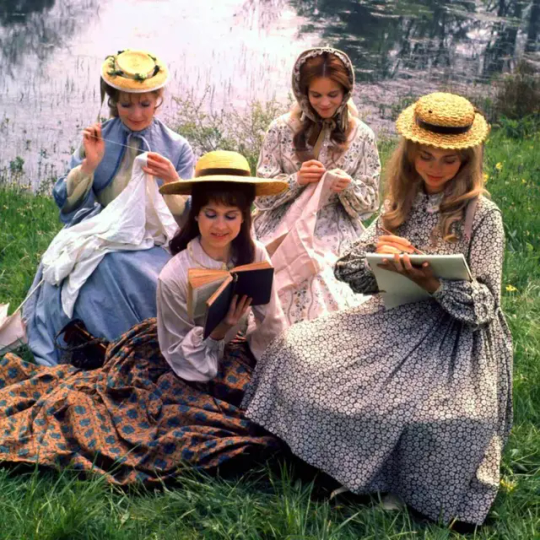
"LITTLE WOMEN" (1970) Review
It is very rare to find a British adaptation of an American novel. It is even rarer to find more than one adaptation. Louisa May Alcott's 1868 novel, "Little Women" must have been very popular with the BBC network. The latter had adapted the novel four times. Several years ago, I had seen the network's 2017 version. I thought it was the only version adapted by the BBC . . . until I had stumbled across the 1970 adaptation.
Set during the 1860s decade, "LITTLE WOMEN" told the story of the four March sisters of Concord, Massachusetts and their coming of age stories during and after the U.S. Civil War. With second daughter Josephine aka Jo serving as the story's main protagonist, the miniseries focused on the sisters' struggles with the family's diminished finances, their personal ambitions and especially their love lives. Early in the story, the March sisters become acquainted with their neighbor, one Theodore "Laurie" Lawrence, grandfather Mr. Lawrence and his tutor, John Brooke. Whereas third sister Beth develops a friendship with the elderly Mr. Lawrence, oldest sister Meg falls in love with Mr. Brooke, and the youngest Amy develops from a slightly vain and coddled child to a mature and self-assured young woman. As for Jo, the story focused on her development from a temperamental and stubborn girl, who learns to maintain her hot temper, navigate through her relationships with two men and adhere to her ambitions to become a writer.
Another surprising aspect of "LITTLE WOMEN" that I had learned was that it was the longest adaptation of Alcott's novel with a total running time of 225 minutes. This gave screenwriters Alistair Bell and Denis Constanduros to be as faithful to Alcott's novel as possible. Were they? Somewhat. The pair did take care to explore Laurie's volatile relationship with his grandfather - something that a good number of the other adaptations had failed to do. And it allowed glimpses into his growing relationship with Amy in Europe. Also, the early stages of Meg's marriage to Mr. Brooke ended up being explored, something that only the 2019 movie adaptation had repeated. I believe the miniseries did a very solid job of conveying these aspects of Alcott's novel.
But the miniseries left out Meg and Laurie's experiences at Annie Moffat's party. The miniseries also left out the sisters meeting with Laurie's English friends - something only the 2017 adaptation had included. Bell and Constanduros had changed the time period of Amy's near drowning at Walden Pond from the winter to either the spring or summer, allowing a rickety pier to send her into the pond, instead of thin ice. And it never touched on Amy's violent encounter with her schoolteacher over pickled limes. Did these aspects of the screenplay harm the production? Hmmmm . . . perhaps not. But I do feel that the miniseries' increased emphasis on the Lawrence men's relationship came dangerously close to overshadowing the March sisters' own relationships. I am relieved that the miniseries managed to focus somewhat on Jo's relationship with Professor Bhaer. However, I do have a problem with the sexist manner in which Constanduros and Bell had the professor viewed his future marriage to Jo. Whatever admiration Professor Bhaer had for Jo's writing skills seemed to fly out of the window in his anticipation of her being a good wife. Superficially, I had no problems with the brief focus on Meg and John's marriage, even if it could have been somewhat more thorough. But I believe it exposed what I believe was one of the miniseries' main problems.
"LITTLE WOMEN" did have its share of problems. Like the 1978 television adaptation, it is clear to see that it suffered somewhat from a low budget. If I must be frank, that seemed to be more obvious in this adaptation. Aside from Amy's near drowning at Walden Pond and some of European settings featuring Amy and Laurie, all other scenes had obviously been shot inside a studio. Very disappointing, considering a good number of BBC productions featured a mixture of interior and exterior shots. I found the actresses' makeup and hair - especially the latter - to be inconsistent and frankly, a big mess. Betty Aldiss' costume designs seemed solid enough, but not particularly earth shattering. Although the cast solely featured British performers, I believe a handful of them managed to handle American accents quite well - especially Stephen Turner, Stephanie Bidmead and Martin Jarvis. But despite their solid or excellent performances, the rest of the cast seemed to struggle maintaining one. And could someone please explain why three of the actresses who portrayed the March sisters seemed to be incredibly loud? Nearly every time one of them spoke, I had to turn down my television's volume. Some have explained these scenes featuring quarreling between the four sisters. They have even gone as far to claim this adaptation was the only one that featured the sisters often quarreling. Well, they would be wrong. Nearly every adaptation (I am not certain about the 1933 movie) of Alcott's novel featured quarrels between the sisters. So, this explanation does not strike me as a good excuse for the loud voices.
Judging from the previous paragraph, one would assume I have a low opinion of the majority of performances featured in "LITTLE WOMEN". Not really. Most of the performances featured in the miniseries struck me as pretty solid. Actresses Angela Down ("Jo"), Jo Rowbottom ("Meg"), Janina Faye (Amy) and Sarah Craze ("Beth") all gave solid performances and managed to capture the nuances of their individual characters in a competent manner. As I had stated earlier, I had a problem with most of them - with the exception of Craze - resorting to loud and histrionic voices in their portrayals of the March sisters at a younger age or in the case of Rowbottom, engaged in a heated quarrel. I thought Jean Anderson gave a solid performance as the stuffy Aunt March. Frederick Jaeger gave a very likeable performance as Jo's love interest, the intellectual Professor Friedrich Bhaer. And I believe the actor had a solid screen chemistry with Down. I really had a problem with actress Pat Nye, who portrayed the family's housekeeper, Hannah. Nye's handling of Hannah's American accent struck me as ridiculously exaggerated . . . to the point that her accent almost seemed Southern. Patrick Troughton, a talented actor in his own right, had more or less been wasted in his role as the family's patriarch, Mr. March. I do not believe he had spoken more than three to five lines in this production.
I can think of at least four performances that really impressed me. It seemed a pity that not one of them came from the four actresses who portrayed the sisters. Oh well. John Welsh has my vote as the second best version of Mr. James Lawrence, the March family's wealthy neighbor. I thought he did an excellent job of developing his character from a strict and curmudgeon guardian to a warm-hearted man who learned to develop a relationship with his grandson. Most portrayals of John Brooke, Meg's future husband, have never impressed me. But I must say that I found Martin Jarvis's portrayal of the character more than impressive. The actor was given an opportunity to delve more into Mr. Brooke's personality and he ended up giving one of the better performances in the miniseries. If given the chance to vote for the best performance in "LITTLE WOMEN", I would give it to Stephen Turner for his portrayal of the sisters' close friend, Theodore "Laurie" Lawrence. I suspect Turner had greatly benefited from Bell and Constanduros's script, which seemed more interested in Laurie as a character than the four leads. But judging from Turner's performance, I suspect his would have overshadowed everyone else's due to the actor's superb handling of the character. I also have to compliment Stephanie Bidmead's portrayal of the March family's matriarch, Mrs. "Marmee" March. Not only did I find her performance warm and elegant, but it also lacked the dripping sentimentality of the earlier versions and the heavy-handed attempts to make the character "modern" - relevant to today's movie and television audiences.
"LITTLE WOMEN" had its flaws. I cannot deny this. But I feel its flaws - which included a limited budget and some questionable American accents - were not enough to dismiss the nine-part miniseries as unworthy. I believe the 1970 miniseries proved to be a lot more solid and entertaining than some fans of Alcott's novel believed, thanks to Paddy Russell's competent direction, a damn good screenplay by Denis Constanduros and Alistair Bell, and a first-rate cast led by Angela Down.
#costume drama#period drama#period dramas#little women#little women 1970#louisa may alcott#little women bbc#jo march#angela down#meg march#jo rowbottom#janina faye#amy march#sarah craze#beth march#stephanie bidmead#stephen turner#martin jarvis#frederick jaeger#patrick troughton#pat nye#u.s. civil war#john welsh#paddy russell#denis constanduros#alistair bell
9 notes
·
View notes
Note
Knowing that it's one of your favourite films, have you ever written or have any wish to write anything about Ken Russell's Altered States? I watched it last night and was appropriately dazzled by his images and high conceits, but I can't help feeling that, like Dostoevsky, the final embrace of love as a panacea feels forced and inadequate in comparison to the earlier spiritual darkness of the self that begets the high visions.
I haven't written extensively about it, but I did discuss the film, and particularly this aspect of it, with the poet Emmalea Russo at the end of our conversation from last summer.
Obviously Russell's spectacular aesthetic accommodates a tragic conclusion, as when he's working with the more "severe" literary source material provided by Lawrence and Huxley for Women in Love and The Devils, respectively. Chayefsky's script for Altered States could be described ungenerously as promoting the quotidian, even the bourgeois, against the pursuit of metaphysical extremity these earlier films indulge. We could even historicize this development, if we really wanted to be wet blankets, by seeing the 1980 film as a document of the transition between the residua of the radical '60s and the vanguard of the conservative '80s.
(Here I would distinguish Chayefsky from Dostoevsky, whose vision of Christian "active love" seems more extreme than what Chayefsky portrays: for example, if you contrast Sonya's extremes of self-sacrifice in Crime and Punishment, the novel's ethical model, with the more mundane portrait of an apparently resilient marriage in Altered States—and not even a resilient marriage as the spiritual communion of gnostic self-sufficient souls, as with Lawrence's Rupert and Ursula—or perhaps Rupert and Gerald—in the aforementioned Women in Love, but rather an apotheosis of loyalty and affection over this kind of soul-vision.)
And yet for all that I am willing to take Altered States on its own terms: there is nothing really there for us in that inner space or journey back down the brain stem the film's visionary sequences depict. It's not truer than anything else we experience for all that it may be more spectacular, hence the idea Pauline Kael alludes to that there is some conflict in the film between Russell's Catholic baroque and Chayefsky's Jewish iconoclasm. In any case, the film's thesis is that primordial holds no priority, that evil is not more interesting for being only the absence of love. I think the film is a coherent elaboration of this idea, but it's certainly true that Russell's visionary and occult imagery overwhelms the philosophy and is mostly what we remember—unless we join Emmalea Russo in our conversation linked above and romanticize the party sequence where Edward and Emily meet in the first place and allow the (erotic) charisma of the actors to challenge the memorable perversities displayed elsewhere in the film.
As for the overall question of whether or not a happy ending cheats an otherwise dark narrative or dramatic vision of its integrity, I tend to think not. Hegel gives us a test we can apply in his Aesthetics (I quote the Osmaston translation from Hegel on Tragedy):
Much as poets present to us the bare downfall of particular people they are also able to treat the similar contingency of the development of events in such a way, that, though the circumstances in all other respects would appear to give them little enough support, a happy issue of such conditions, and characters is secured, in which they elicit our interest. No doubt the favour of such a destiny of events has at least an equal claim upon us as the disfavour. And so far as the question merely concerns the nature of this difference, I must admit that I prefer a happy conclusion. How could it be otherwise? I can myself discover no better ground for the preference of misfortune, simply on its own account as such, to a happy resolution than that of a certain condition of fine sensibility, which is devoted to pain and suffering, and experiences more interest in their presence than in painless situations such as it meets with every day. If therefore the interests are of such a nature, that it is not really worth the trouble to sacrifice the men or women concerned on their altar, it being possible for them, either to surrender their objects, without making such surrender as is equivalent to a surrender of their individuality, or to mutually come to an agreement in respect thereof, there is no reason why the conclusion should be tragic. The tragic aspect of the conflicts and their resolution ought in principle merely to be enforced in the cases where it is actually necessary in order to satisfy the claim of a superior point of view.
In other words, a tragic resolution is only required if the narrative logic demands the sacrifice of the characters to a worthwhile principle higher than themselves. (Hegel's model is the ideological conflict between legitimate transcendent principles—the family vs. the social order—in Antigone.) Lawrence's extraordinarily ideal vision of marriage, to which neither Gerald nor Gudrun can measure up, might also qualify in Women in Love, and likewise Grandier's fidelity to a kind of robust human wholeness threatened with extinction both by the hysterical nuns and the pious witchfinders in The Devils. But if a character is immolated for a worthless principle, then we are, Hegel suggests, in the presence of a merely morbid authorial sensibility. On this account, Dostoevsky's Christian ideal and Chayefsky's humanist one deserve their triumph over the evils that confront them, however (merely) spectacular. Whether in aesthetics there is any such thing as a "mere" spectacle is another question, of course, and we continue to dream of a work of art that is whole and unriven, its theme and its form one and indivisible—at least as a picture of human happiness.
(You might please keep all of this mind as you read the forthcoming epilogue of my novel Major Arcana...)
5 notes
·
View notes
Text
#movie list#list challenges#cinephile#horror#letterboxd#movies#classic film#disney#animation#orlando bloom#bryce dallas howard#paddy considine#ian mcshane#sean bean#kyle gallner#britt robertson#esai morales#matthew lillard#keri russell#michael vartan#skeet ulrich#bridget fonda#christopher walken#tom arnold#gina gershon#janeane garofalo#breckin meyer#ll cool j#crispin glover#ruby rose
0 notes
Text
In 1572, the time traveling alien known as the Doctor (Doctor 1) and his companions arrived in Paris and a matter of mistaken identity almost got the Doctor executed. ("The Massacre", Doctor Who, vlm 1 TV)

#nerds yearbook#sci fi tv#time travel#1572#dw#doctor who#paris#john lucarotti#donald tosh#paddy russell#doctor 1#1st doctor#william hartnell#peter purves#steven taylor#andre' morell#leonard sachs#david weston#annette robertson#eric thompson#john tillinger#joan young#michael bilton#jack tarran#leslie bates#john slavid#jackie lane#dodo chaplet#john peterson#james appleby
18 notes
·
View notes
Text
Who is most important to the history of Doctor Who?

TOURNAMENT MASTERPOST
propaganda under the cut
Graeme Harper – the only director of both Classic and NuWho
Directed some really important Doctor Who episodes in both New Who and Classic Who. (@go-to-the-mirror )
Paddy Russell – Classic Who director
directed some of the best classic who stories, pyramids of mars, horror of fang rock, invasion of the dinosaurs, her directing is great, wish she were better known (anonymous)
Rachel Talalay – NuWho director
She is such a great director! You've probably seen some of her greatest hits-- The Star Beast, Dark Water/Death in Heaven, Twice Upon A Time, and oh yeah, she did Heaven Sent/Hell Bent and World Enough and Time/The Doctor Falls! She delivers GORGEOUS looking episodes because she understands the light comes from the same place as the music. She is my favorite director in television and I have sent her fanmail. (anonymous)
Waris Hussein – directed An Unearthly Child
A gay, Indian man who took the role of directing Doctor Who's first story, and a few other stories from the First Doctor's era. So he was one of the people that made Doctor Who come to life. The characterisations and acting choices are clear from the beginning, and I think it's just a shame that most of his work is either missing or not available for much of the public to watch. Despite, this I believe he has made a huge contribution to Doctor Who that cannot be underestimated. (@b4s1lwh0 )
#whostory: round 1#graeme harper#paddy russell#rachel talalay#waris hussein#christopher barry#richard martin#alice troughton
9 notes
·
View notes
Text
youtube
youtube
youtube
youtube
youtube
youtube
youtube
youtube
youtube
youtube
Pride
Erscheinungsjahr 2014
120 min
Regie: Matthew Warchaus
Dartsteller: Ben Schnetzer, George MacKay, Faye Marsay, Andrew Scott, Dominic West, Paddy Considine, Freddie Fox, Jessica Gunning, Imalda Staunton, Bill Nighy, Russel Tovey
#pride 2014#pride#ben schnetzer#george mackay#faye marsay#andrew scott#dominic west#paddy considine#freddie fox#jessica gunning#imelda staunton#bill nighy#russel tovey#matthew warchus
14 notes
·
View notes
Text

#Cinderella Man#Russell Crowe#Renée Zellweger#Paul Giamatti#Craig Bierko#Bruce McGill#Paddy Considine#Ron Howard#2005
19 notes
·
View notes
Text
I can't be too anti-Carlton today, what if my friend never takes me to a Good Friday game ever again and

#yes of course i like Carlton shhhhh i can name so many of their players#there's Daisy and Faz and Jordan Russell and#does Cameron Wood still play#Mick Malthouse is the coach#there's the cheesecake guy and the one with the standing up guitar and the virgin boy and#there's paddy wow and fishbinns and matt christmas carroll and#see I'm a great choice to take along to a Carlton game#i know the song#with the champions (Fasolo!) that they like to send us (Bianco!)#The team that never lets you down#something something old navy blues something#we lift our bottom ends up
1 note
·
View note
Text
A Day On Fang Rock: Doctor Who Season 15 BFI Event for The Collection's Release
A Day On Fang Rock: #DoctorWho Season 15 BFI Event for The Collection's Release
It’s getting much more difficult nowadays to get tickets for any Doctor Who screenings, including the Riverside events. However, while grabbing a BFI ticket is nigh on impossible, my friend Maria always has quite good luck so we were able to go to and see one of the best classic Doctor Who stories around — Horror of Fang Rock. For those who have never been to a BFI event, they are excellently…
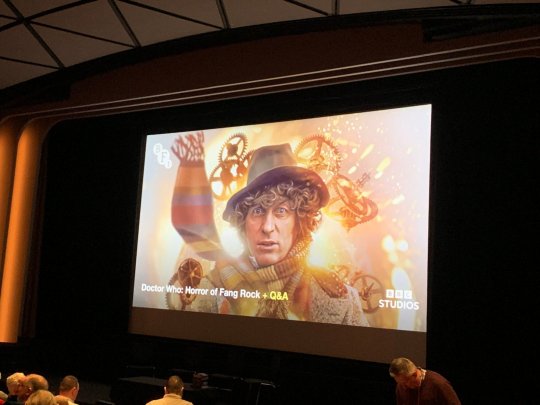
View On WordPress
#60th Anniversary#Agatha Christie#And Then There Were None#Annette Woollett#BFI#Chris Chapman#Doctor Who - The Collection#Doctor Who Season 15#Fourth Doctor#Frank Skinner#Horror of Fang Rock#Image of the Fendahl#John Abbott#John Leeson#K9#Leela#Louise Jameson#Mark Ayres#Paddy Russell#Pete McTighe#Terrance Dicks#The Church on Ruby Road#Tom Baker
0 notes